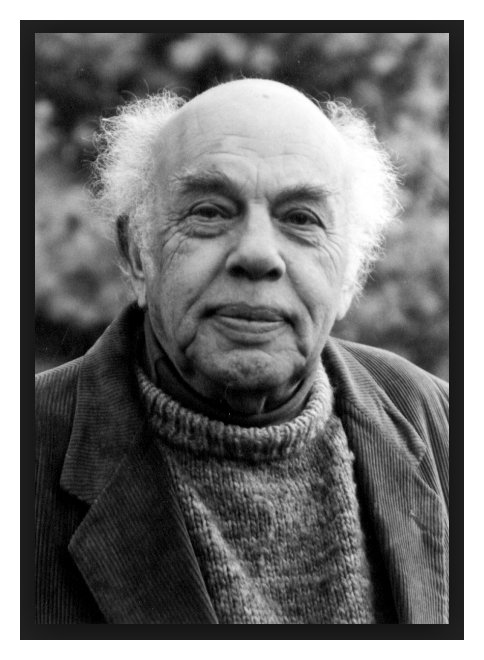

| Obituary: Harold Shapero, composer
and teacher Born April 29, 1920; died May 17, 2013 Harold Shapero was best known as the composer of the Symphony for Classical Orchestra (1947), perhaps the perfect expression of the neo-Stravinskyan aesthetic he shared with his lifelong friends Arthur Berger, Irving Fine and Leonard Bernstein, who conducted the Symphony’s premiere in 1948. Shapero first came to notice when his Nine-Minute Overture (1940) was performed in 1941 by a student orchestra at Tanglewood conducted by Copland. The Overture won the Rome Prize in the same year but the entry of the US into the Second World War prevented Shapero’s travelling to Italy as part of the award. At that time Shapero was a pupil of Hindemith, but he had previously studied with Slonimsky, Krenek (from whom he learned dodecaphony, later rejecting it) and, at Harvard, Walter Piston. Later he studied with Nadia Boulanger through whom he was introduced to Stravinsky. Shapero’s compositional voice may not have been the most distinctive, but he was not an uncritical emulator of the Russian and works like the Third of Three Amateur Sonatas for piano (1944) show him assimilating Stravinskyan rhythms within a basically lyrical-melodic style with a mildly American accent. Shapero’s list of orchestral works include two further symphonies (for string orchestra, 1946; for orchestra, 1948, a revision of the overture The Traveler), the Serenade in D major for string orchestra (1945, arranged in 1998 as a string quintet), Credo for orchestra (1955), a Partita in C major for piano & orchestra (1960) and a Trumpet Concerto (1995). He also composed a String Trio (1937), String Quartet (1941) and sonatas for trumpet (1940) and violin (1942) as well as a larger, unnumbered Piano Sonata in F minor (1948) plus an earlier example for four hands (1941) – he was a fine pianist – and the Wind Quintet, Six for Five (1995). Shapero’s musical interests extended to other areas, as in his On Green Mountain for jazz ensemble (1957) and longstanding interest in electronic music. He taught music theory and composition at Brandeis University from 1951-88 during which time he cultivated the faculty’s electronic music studio and composed and improvised for electronic as well as acoustic instruments. Shapero twice won Guggenheim Fellowships (1947-8) and Fulbright Fellowships (1948 and 1960) and was composer-in-residence at the American Academy in Rome in 1970. By this time he had largely withdrawn from composition in the face of critical disfavour, though resumed fitfully after Previn successfully revived and later recorded the Symphony for Classical Orchestra in Los Angeles. He had a wide range of interests, from ornithology and gardening to photography and the poetry of John Whittier (some of whose poems Shapero set for soprano, tenor, flute, cello & piano in 2005-7). One of his final works was a set of 24 Bagatelles for piano He was born in Massachusetts and died there peacefully in his sleep following a bout of pneumonia, aged 93. He is survived by his wife, Esther, and daughter Hannah (aka Pyra), both artists. -- Guy Rickards, Gramophone Magazine
-- Names which are links in this box and below refer to my interviews elsewhere on my website. BD |
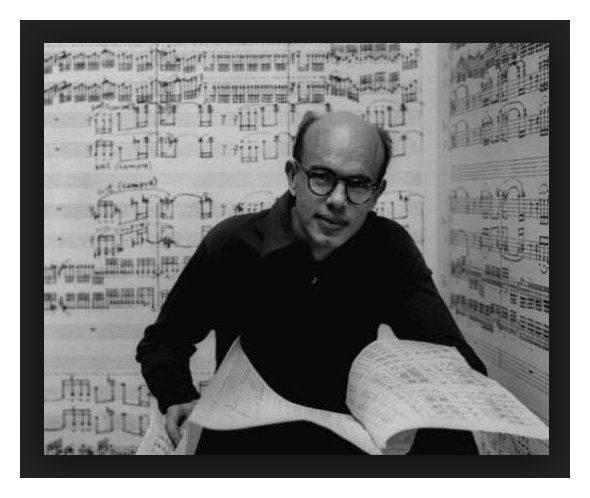 BD: In all those years,
how did you divide your time between teaching and composing?
BD: In all those years,
how did you divide your time between teaching and composing?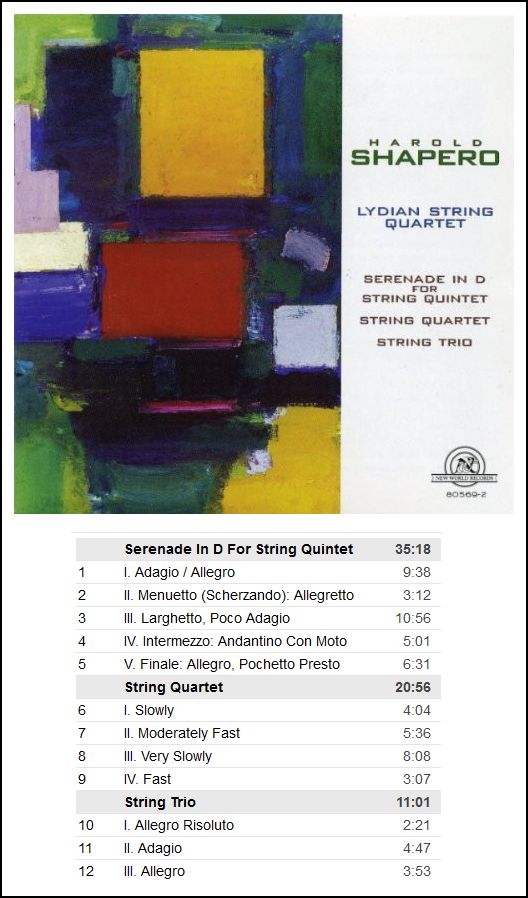 BD: Are you finding
that each one of your young composers is getting his or her ten or fifteen
minutes, or is it passing them by?
BD: Are you finding
that each one of your young composers is getting his or her ten or fifteen
minutes, or is it passing them by?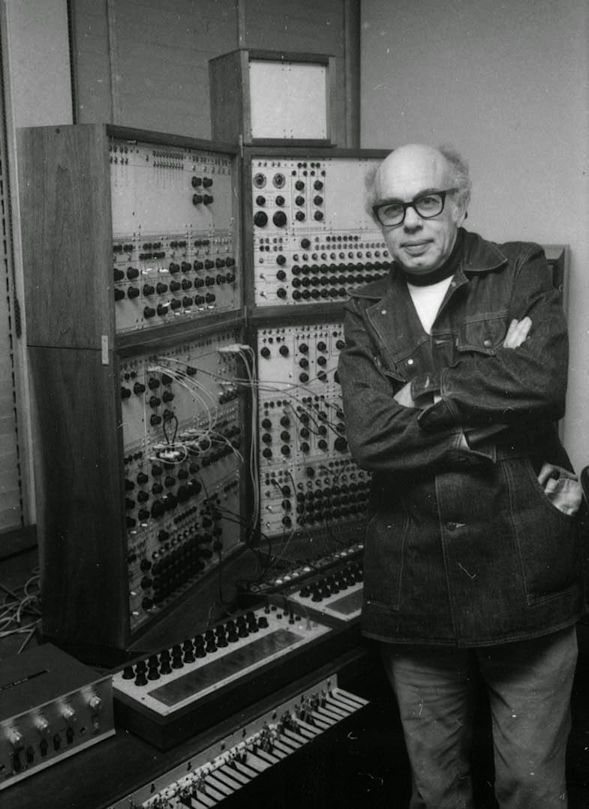 HS: That kind of thing, yes. It’s worth
exploring, and we had some interesting ventures. Some engineers and
I were trying to create a synthesizer which played exactly like the instruments,
as well as an instrument which did all the electronic sounds, too.
That’s not an easy job, electronically, to imitate the instruments in the
orchestra exactly. But it was a fascinating one.
HS: That kind of thing, yes. It’s worth
exploring, and we had some interesting ventures. Some engineers and
I were trying to create a synthesizer which played exactly like the instruments,
as well as an instrument which did all the electronic sounds, too.
That’s not an easy job, electronically, to imitate the instruments in the
orchestra exactly. But it was a fascinating one.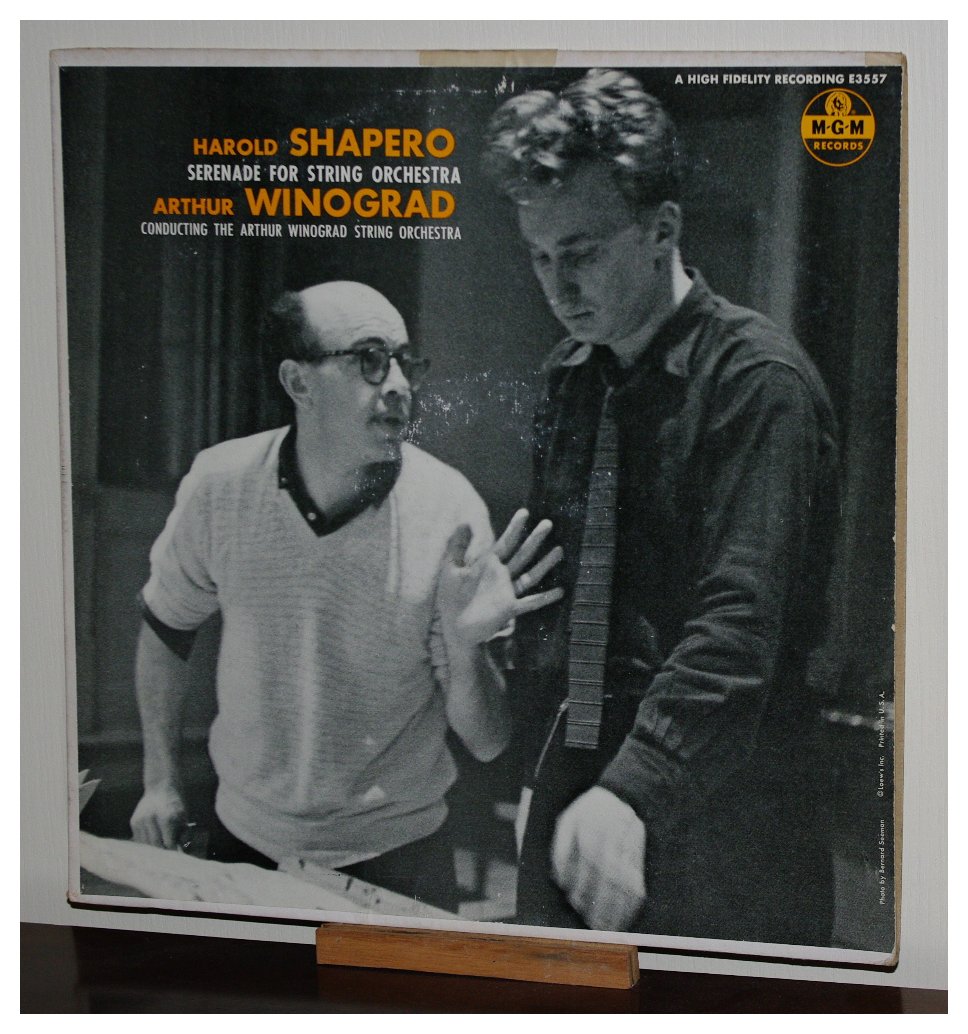
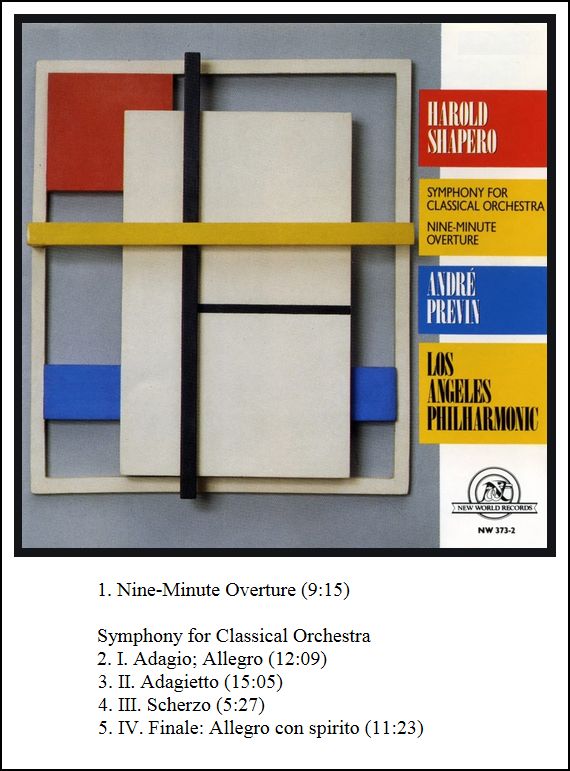 BD:
What about the Credo for Orchestra?
That was written on commission for the Louisville Orchestra.
BD:
What about the Credo for Orchestra?
That was written on commission for the Louisville Orchestra.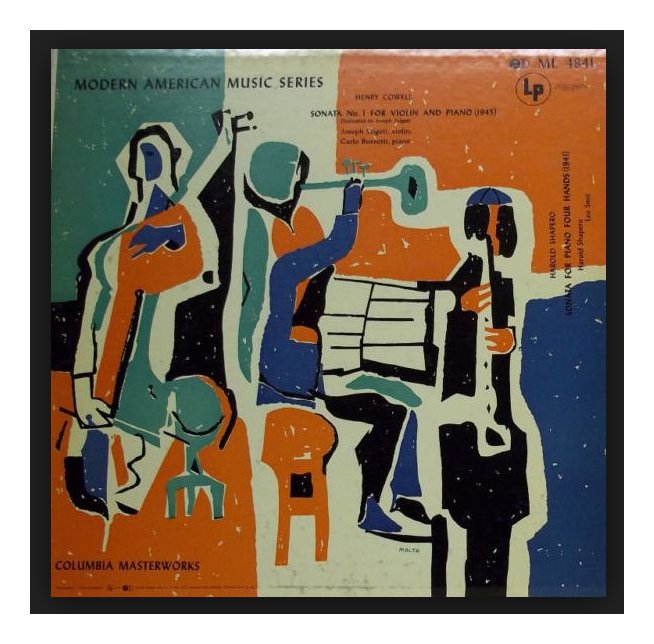 BD: There’s enough fire in it?
BD: There’s enough fire in it?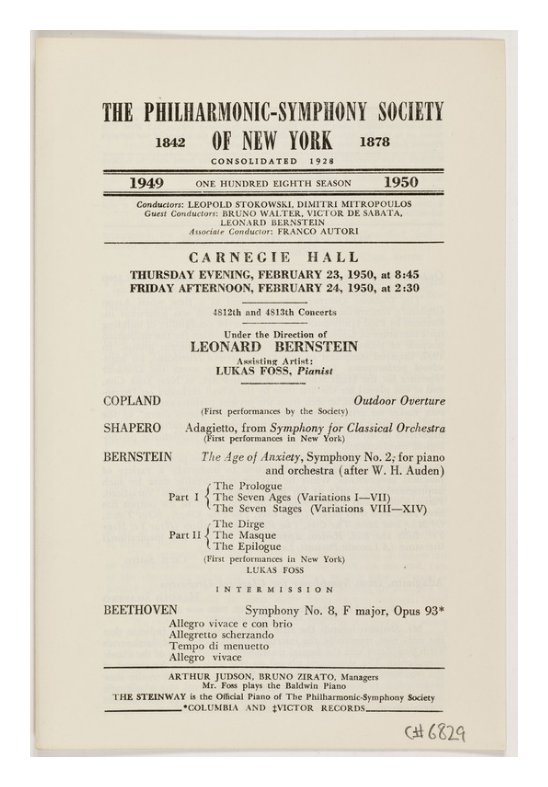 BD:
Is there any music you’ve forgotten you’ve written?
BD:
Is there any music you’ve forgotten you’ve written?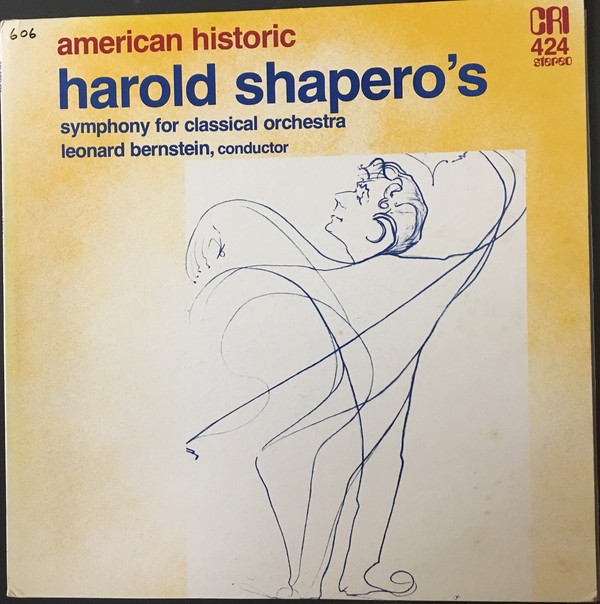 HS:
I think he was San Francisco. This was L.A. He’s equally famous.
HS:
I think he was San Francisco. This was L.A. He’s equally famous.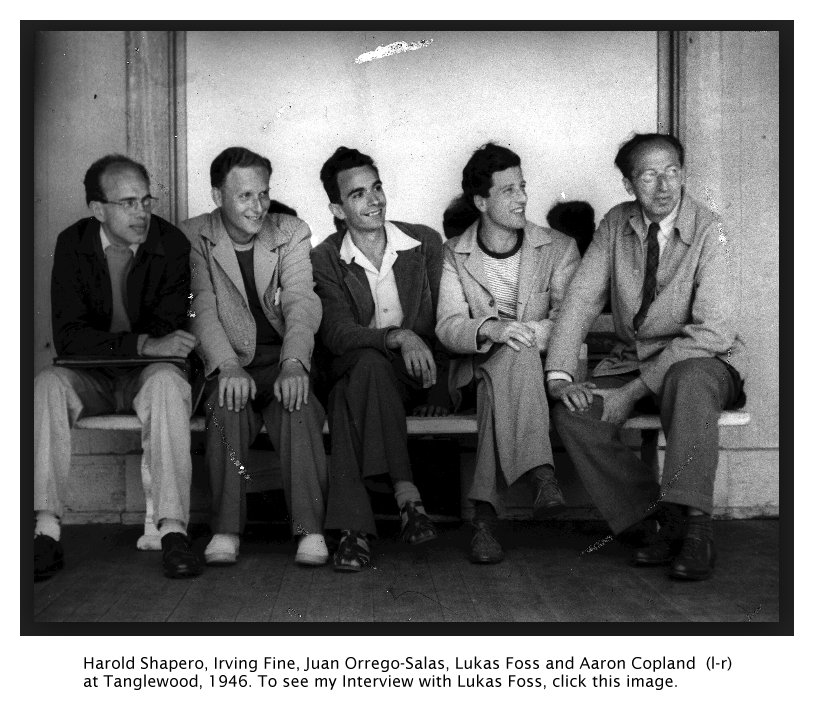 BD:
As you approach your seventieth birthday in another year and a half, what’s
perhaps the most surprising thing that you’ve noted in music?
BD:
As you approach your seventieth birthday in another year and a half, what’s
perhaps the most surprising thing that you’ve noted in music?|
Harold Shapero, American Neo-Classical Composer,
Dies at 93
By ANTHONY TOMMASINI Published: The New York Times, May 21, 2013 [Text only] Harold Shapero, a composer who was a central figure of American Neo-Classicism, a school of composition that thrived in the 1940s and ’50s, died on May 17 in Cambridge, Mass. He was 93. His death, at a nursing home, was announced by his family through a post on the Web site of Brandeis University, where Mr. Shapero, a professor emeritus, taught for 37 years. Born in Lynn, Mass., on April 29, 1920, Harold Samuel Shapero had a diverse musical youth. He became a skilled pianist, played jazz for fun and profit, and as a teenager studied composition with the Austrian-born composer Ernst Krenek, who tutored him in the 12-tone technique. But Mr. Shapero was drawn to Neo-Classical idioms, especially at Harvard, where he was a student of the American composer Walter Piston, and at the Berkshire Music Center in Lenox, Mass., where he worked with Paul Hindemith and became a close associate of Aaron Copland, who was 20 years older. The early 1940s was a period when many American composers were exploring complex methods and procedures, especially 12-tone technique. Neo-Classicists like Piston wrote works that essentially hewed to tonal harmony, put a premium on textural clarity and used traditional forms. Mr. Shapero, though, was particularly engaged by Stravinsky’s harmonically spikier and rhythmically vibrant Neo-Classical works. During the 1940s he wrote prolifically, including three witty and inventive piano sonatas, an exuberant Sonata for Violin and Piano, and diverse chamber works and songs. His major achievement during this period was his Symphony for Classical Orchestra, a 45-minute work in four movements, completed in 1947. When he began writing the symphony, Mr. Shapero thought he had undertaken a divertimento that would last at most 20 minutes, as he recalled in a 1999 interview with The New York Times. “But I had wildly miscalculated my materials,” he said. “When I measured out the slow movement, I was shocked. It was 15 minutes. I stopped working for a month. Then I tried to cut the thing. But it fought me and won. Slowly I became aware, with horror, of what I was writing: a long and difficult symphony. I thought I’d never get it performed.” But Leonard Bernstein, then 29, who had known Mr. Shapero at Harvard, found he had “fallen in love” with the piece, as Bernstein explained in a note to Serge Koussevitzky, the conductor of the Boston Symphony Orchestra. [A portion of that note is reproduced below.] Bernstein conducted the symphony’s premiere in a guest appearance with the Boston Symphony in January 1948. 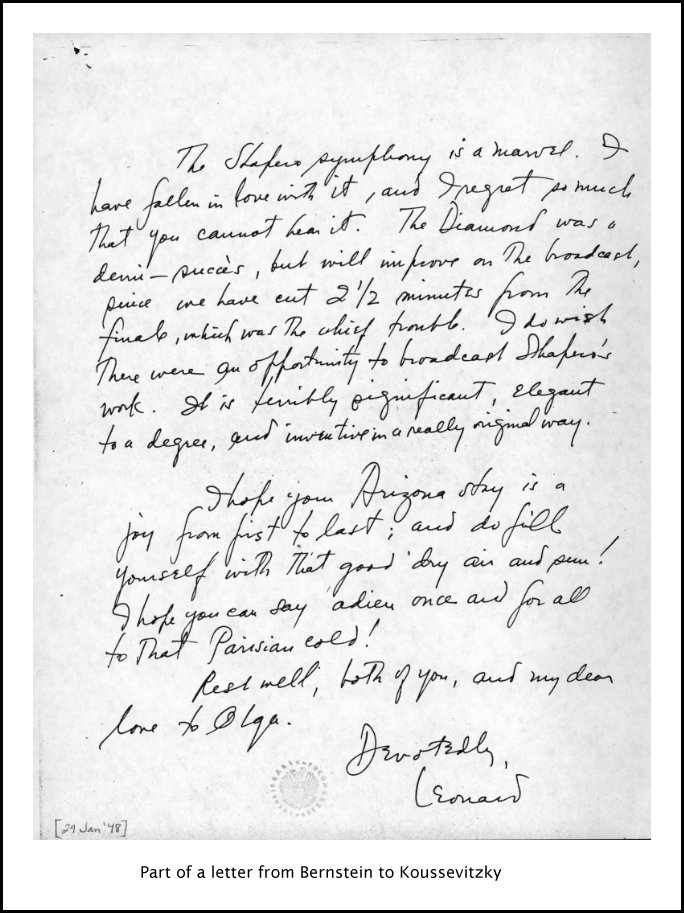
Two months later, Georg Szell performed it with the Cleveland Orchestra, though Szell had to be talked into doing so at a time when the orchestra was under pressure to play some American works. Szell had expressed doubts about the symphony during his first meeting with Mr. Shapero. “Szell was a fabulous musician who hated modern music,” Mr. Shapero recalled. “He summoned me, asked me to play the piece on the piano, then told me I didn’t know how to modulate and should study Richard Strauss.” The reviews were equivocal. The symphony, though long and difficult, is ingenious and engrossing. A shimmering opening Adagio segues into a bustling, contrapuntally complex Allegro, followed by a wistful Adagio, a misbehaving Scherzo and a hurtling, imposing finale. This audacious piece is like a brash, American contemporary counterpart to Beethoven’s Seventh Symphony. On a single hectic day in 1953, Bernstein, though suffering from a fever, recorded the Shapero symphony with the Columbia Symphony Orchestra, a studio ensemble of top freelance New York musicians. But even that recording did not prevent the piece from slipping into oblivion, until 1986, when André Previn performed it, to acclaim, in Los Angeles with the Los Angeles Philharmonic. Martin Bernheimer, then a critic for the Los Angeles Times, wrote that “Shapero reveals himself here as a superb craftsman, an artist totally in control of the grandiose variables at hand.” The writing, he added, “is clever, subtle, elegant.” Ultimately, he wrote, the symphony “isn’t affecting in spite of the inherent anachronisms, but because of them.” Still, these Neo-Classical “anachronisms” found disfavor with the advocates of modernist techniques, who often held sway in the music departments of American universities. By the 1960s, stung by this criticism, Mr. Shapero wrote less and less. He explained his withdrawal to the Los Angeles Times critic Mark Swed in a 1986 interview. “Comfortable university life is a disaster, especially if you have a university that doesn’t pressure you to produce or perish,” he said. “And I had a young child. I like home handicrafts and hobbies. I like gardening. I like photography. So it was only too easy to put off some of those hard operations like writing music.” That child, Hannah Shapero, a commercial artist and electronic musician, survives him, along with his wife, Esther Geller, a visual artist. At Brandeis, Mr. Shapero mentored generations of composers and musicians and helped develop the university’s electronic music studio. After Mr. Previn introduced the Symphony for Classical Orchestra to the Los Angeles audience, he recorded it on the New World label and performed it during guest appearances with Mr. Shapero’s hometown Boston Symphony and other orchestras. This flurry of success motivated Mr. Shapero to compose again, including Three Hebrew Songs for Tenor, Piano and Strings Orchestra (1989) and, recently, 24 Bagatelles for Piano. Even at his nursing home, in his last months, Mr. Shapero requested and was brought manuscript paper. ----- This article has been revised to reflect the following correction: Correction: May 24, 2013 An earlier version of this obituary referred incorrectly to the orchestra that André Previn conducted in 1986, when it performed Mr. Shapero’s Symphony for Classical Orchestra. It was the the Los Angeles Philharmonic, not the Los Angeles Symphony. |
© 1988 Bruce Duffie
This conversation was recorded on the telephone on August 31, 1988.
Portions were broadcast on WNIB in 1990, 1995 and 2000. A copy of
the unedited audio was given to the Oral
History of American Music archive at Yale University. This transcription
was made and posted on this website in 2014.
To see a full list (with links) of interviews which have been transcribed and posted on this website, click here. To read my thoughts on editing these interviews for print, as well as a few other interesting observations, click here.
Award - winning broadcaster Bruce Duffie was with WNIB, Classical 97 in Chicago from 1975 until its final moment as a classical station in February of 2001. His interviews have also appeared in various magazines and journals since 1980, and he now continues his broadcast series on WNUR-FM, as well as on Contemporary Classical Internet Radio.
You are invited to visit his website for more information about his work, including selected transcripts of other interviews, plus a full list of his guests. He would also like to call your attention to the photos and information about his grandfather, who was a pioneer in the automotive field more than a century ago. You may also send him E-Mail with comments, questions and suggestions.